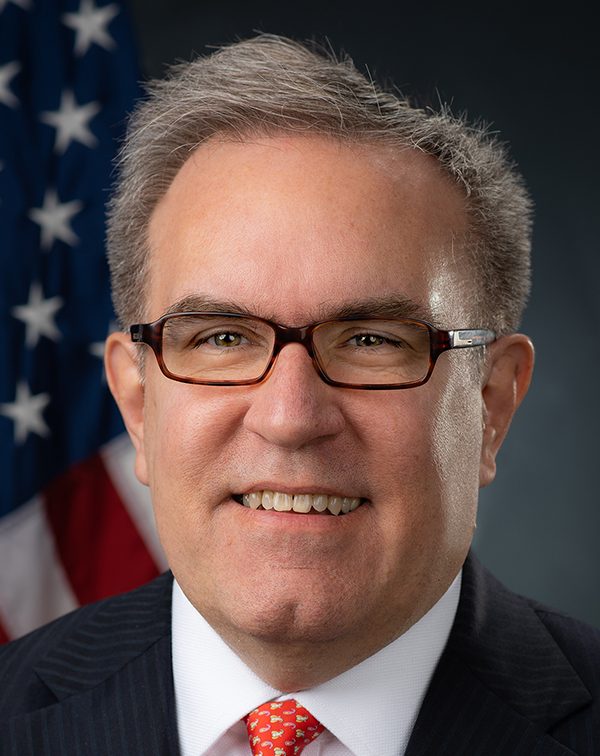Trump Officially Nominates Andrew Wheeler to Head the EPA

President Donald Trump nominated Andrew Wheeler as administrator of the Environmental Protection Agency on Wednesday, setting him up to permanently fill a position he’s already occupied since July.
Trump praised Wheeler in November his “fantastic job” as acting administrator of the EPA following the July 2018 resignation of the agency’s former scandal-ridden head, Scott Pruitt. This month, the president submitted Wheeler’s formal nomination to the Senate. There’s still a ways to go before the ex-lobbyist’s confirmation, though, as the Senate will no doubt be critical of his relatively recent ties to the coal industry.
Of course, attempting to think of an independent government agency that doesn’t have a former lobbyist or corporate executive sitting at the head of its table leads to the conclusion that Wheeler will probably do just fine.
According to Bloomberg, Wheeler said he was “honored and grateful” for the nomination. “For me, there is no greater responsibility than protecting human health and the environment,” he said in an emailed statement. “I look forward to carrying out this essential task on behalf of the American public.”
Wheeler, who spent time as a Republican Senate aide in addition to his energy lobbying duties, clearly responds to Trump’s take on environmental regulation. He also backed many of Pruitt’s more controversial attempts to ease the glut of Obama-era regulations governing pollution that came shortly before the Trump administration took office. However, he’s also been more careful to avoid unwanted scrutiny and slower to play his hand.
Still, we expect more of the same from Wheeler, who’ll likely promote industrial and economic health before environmentalism. He’s already proposed lowering emission mandates for coal-fired power plants, openly backed glider trucks before coming down on them, and appears ready to support Trump’s attempt to rollback Corporate Average Fuel Economy standards for automakers — albeit much more cautiously than his predecessor.
As a result, Wheeler is unlikely to prove popular with Democrats and is sure to be downright despised by environmentalists. But it’s not a cut and dried issue. The EPA’s acting head has been extremely critical of President Trump in the past. He also isn’t the kind of drain-the-swamp outsider the president promised, which could annoy the voter base.
Presently, the United States is doing rather well in terms of pollution. The U.S. has managed to lower its pollution index by a significant margin since 2008, faring better than much of Europe at the end of 2018. But there are miles to go before the nation can start lecturing Finland on how to be kinder to Mother Earth and air quality improvements have been gradually slowing since the early 1990s. Don’t anticipate that will change under Wheeler, who will be focused firmly on the business side of the environment after the government shutdown ends and he gains Congressional approval.
[Images: AvidInsight/ Wikimedia ( CC BY-SA 3.0); USEPA]

A staunch consumer advocate tracking industry trends and regulation. Before joining TTAC, Matt spent a decade working for marketing and research firms based in NYC. Clients included several of the world’s largest automakers, global tire brands, and aftermarket part suppliers. Dissatisfied with the corporate world and resentful of having to wear suits everyday, he pivoted to writing about cars. Since then, that man has become an ardent supporter of the right-to-repair movement, been interviewed on the auto industry by national radio broadcasts, driven more rental cars than anyone ever should, participated in amateur rallying events, and received the requisite minimum training as sanctioned by the SCCA. Handy with a wrench, Matt grew up surrounded by Detroit auto workers and managed to get a pizza delivery job before he was legally eligible. He later found himself driving box trucks through Manhattan, guaranteeing future sympathy for actual truckers. He continues to conduct research pertaining to the automotive sector as an independent contractor and has since moved back to his native Michigan, closer to where the cars are born. A contrarian, Matt claims to prefer understeer — stating that front and all-wheel drive vehicles cater best to his driving style.
More by Matt Posky
Latest Car Reviews
Read moreLatest Product Reviews
Read moreRecent Comments
- Kwik_Shift_Pro4X No thanks. You'll never convince me that anybody needs this.
- Kwik_Shift_Pro4X I'd rather do the driving.
- SCE to AUX EVs are a financial gamble for any mfr, but half-hearted commitment will guarantee losses.BTW, if there were actual, imminent government EV mandates, no mfr could make a statement about "listening to their customers".
- Zachary How much is the 1984 oldmobile (281)8613817
- Yuda Very dystopian. Not good.



































Comments
Join the conversation
Wheeler's past as a lobbyist for the coal industry doesn't make him tainted in any way. Franklin D. Roosevelt appointed Wall Street insider Joseph P. Kennedy as the first chairman of the Securities and Exchange Commission, and JPK did the job he was expected to do, outlawing all the underhanded practices he knew about (and that made him rich). Of course, FDR dangled the possibility of an ambassadorship as reward for cleaning up Wall Street, but the job got done. Wheeler knows how the system works and what needs to be done to clean it up. Unlike Kennedy's mere Commision chairmanship, Wheeler has the prestige of a full Cabinet position, so he's already got the payoff to cap his career.
All my comments yesterday and today are "awaiting moderation". Where are the moderators? Did they take the weekend off? Have they been furloughed? Is this the end of TTAC, killed off by a software glitch nobody can fix?